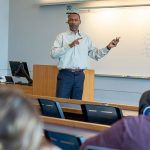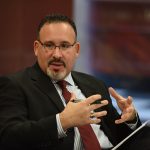Sandra M. Chafouleas, Board of Trustees Distinguished Professor and Neag Endowed Professor in the Department of Educational Psychology at the University of Connecticut, said experts are seeing an increase in concern about mental health and emotional well-being, especially among teenagers who may be missing opportunities to pursue interests, social connection and independence, at a time when communities are also facing serious economic and health impacts.
Dr. Fumiko Hoeft, director of the Brain Imaging Research Center at the University of Connecticut and faculty member at the University of California San Francisco, and Roland Hancock, associate director of the Brain Imaging Center at the University of Connecticut, conceived the app in 2014. Hoeft, along with Devin Kearns at the University of Connecticut, John Gabriell at MIT, and the Dyslexia Center at the University of California San Francisco, are leading the project, which is currently in the final validation phase.
A program specialist for University Events and Conference Services at the University of Connecticut, alumna Anne Hill ’90 (CLAS), ’92 MA, has been planning events across campus for nearly 24 years. When the COVID-19 pandemic hit last spring, Hill and her team had to uproot the strategies they had been using to design in-person events and pivot to online platforms.
“I think it just revealed some of the deep inequities that have existed but didn’t really surface until it was forced to,” says Neag Professor of Educational Policy Casey Cobb. “So that was one of the main things that we’ve learned. I think a lot of schools adjusted very quickly and really made new efforts and creative efforts to keep contact with their families and their kids — with home visits in a safe manner and bringing food to families in need.”
I knew what it meant to be a Black man in America well before I was a parent, before I found out that shoveling my own driveway involves risk, that buying a house brings the potential of lowering property values, that signing up my kids for an education involves countering forces that erode their self-esteem — when schools are still largely segregated and security officers are summoned disproportionately to deal with Black students. But knowing these things now, how can I leave all that at the door?
The Senate on Monday easily confirmed Miguel A. Cardona, a career educator who rose through Connecticut’s education system to become a leader in the effort to reopen pandemic-shuttered schools, as the next education secretary.
His nomination was approved in a vote of 64 to 33.
The Senate confirmed Miguel Cardona to serve as education secretary Monday, vaulting the little-known Connecticut educator into the center of the national debate over how to reopen schools for face-to-face classes.
Education secretaries may not run schools directly, but they can set a tone. Those who know the Biden administration’s pick for education chief, Miguel Cardona, expect his signature spirit of inclusivity to be a unifying force.
President Joe Biden’s nominee for U.S. Secretary of Education, Neag School alumnus and Connecticut’s Education Commissioner Miguel Cardona ’01 MA, ’04 6th Year, ’11 Ed.D., ’12 ELP, was officially confirmed on March 1, 2021, by the U.S. Senate. He is the first UConn graduate in history to hold a Cabinet-level position in the White House.
Gov. Ned Lamont in July tapped Kelli-Marie Vallieres to lead a new state office dubbed the Connecticut Workforce Unit. Under Vallieres — formerly CEO of Sound Manufacturing and Monster Power Equipment in Old Saybrook — the group collaborates with the Department of Economic and Community Development and Department of Labor to advise the governor and other state officials on workforce strategies and initiatives.



